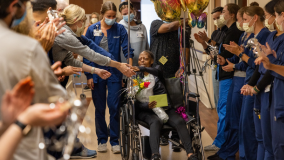We offer a multidisciplinary approach to care for patients with advanced lung disease. The Lung Transplant Program brings together a team of experts in conditions such as:
- Adult cystic fibrosis
- Chronic obstructive pulmonary disease (COPD)
- Interstitial lung disease
- Primary and secondary pulmonary hypertension (high blood pressure)
- Alpha 1 anti-trypsin deficiency
- Bronchiectasis
- Histiocytosis
- Pulmonary fibrosis
- Sarcoidosis
- COVID -19
- Certain types of cancer confined to the lungs
At Northwestern Medicine, we are dedicated to research and innovation. Our team has made fundamental discoveries to improve the care of patients undergoing lung transplants.
According to the 2023 SRTR Report, the Lung Transplant Program had the best outcomes for lung transplants in Illinois in 2023. We also performed the most lung transplants in the state and were No. 4 in the U.S. for number of lung transplants performed, per the 2023 SRTR Report.






